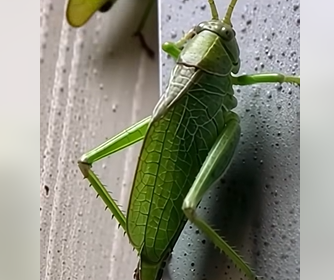In the vast theater of nature, some of the most extraordinary actors go unnoticed. Among them is the leaf grasshopper, a remarkable insect whose delicate camouflage and subtle presence remind us of the quiet beauty woven into the natural world.
A Master of Disguise
At first glance, the leaf grasshopper looks less like an insect and more like part of the plant it calls home. Its wings are shaped and veined to resemble leaves — sometimes even showing tiny details like “bite marks” or discoloration that mimic real foliage. This natural disguise isn’t just artistry; it’s survival. Predators often overlook the grasshopper completely, mistaking it for part of the greenery.
The Messenger in Silence
Unlike butterflies or bees that captivate with movement and color, the leaf grasshopper teaches a different lesson: the power of stillness. Its quiet existence speaks volumes about adaptation and resilience. To many cultures, creatures like this are seen as subtle messengers — urging us to slow down, observe, and appreciate the hidden wonders around us.
Ecological Role
Leaf grasshoppers are more than just masters of camouflage. They play an important role in the ecosystem by:
- Feeding predators: Birds, reptiles, and small mammals rely on them for nourishment.
- Maintaining balance: As herbivores, they help regulate plant growth.
- Indicators of health: Their presence (or absence) can signal the well-being of local habitats.
A Reminder for Us
In a fast-paced world, the leaf grasshopper serves as nature’s quiet reminder: beauty and meaning are often found in subtlety. While it hides in plain sight, it also teaches us to look closer — to value the small, the overlooked, and the patient rhythms of the natural world.
Final Thoughts
The leaf grasshopper may not have the fame of a butterfly or the charm of a ladybug, but its silent message is profound. By blending so seamlessly into its surroundings, it reminds us that sometimes the greatest strength lies in harmony, not in standing out.
It is, quite fittingly, nature’s quiet messenger.
